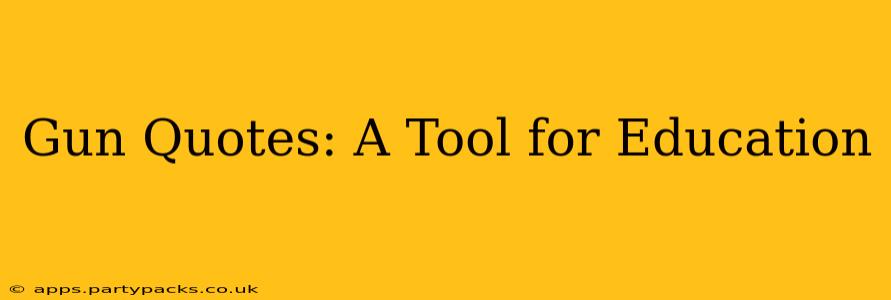Gun control is a deeply divisive issue, sparking passionate debate and strong opinions on both sides. While the topic itself is often fraught with emotion, exploring carefully selected gun quotes can offer a surprising path toward education and a more nuanced understanding of the complexities involved. Instead of simply serving as inflammatory rhetoric, quotes can act as powerful catalysts for critical thinking and constructive dialogue. This article will explore how gun quotes can be used as educational tools, examining their context, analyzing their impact, and ultimately fostering more informed discussions.
What Makes Gun Quotes Effective Educational Tools?
Gun quotes, when carefully chosen and thoughtfully presented, can serve several educational purposes:
-
Highlighting Different Perspectives: Quotes from advocates for stricter gun control, opponents of such measures, and those with lived experiences (e.g., victims of gun violence, law enforcement officers) provide diverse viewpoints on the issue. This exposure helps broaden perspectives and challenge preconceived notions.
-
Stimulating Critical Thinking: Analyzing the language, underlying assumptions, and potential biases within a quote encourages critical engagement with the information. This fosters the ability to discern facts from opinions and identify persuasive techniques used in the gun control debate.
-
Encouraging Empathy and Understanding: Exposure to quotes expressing the pain and suffering resulting from gun violence can cultivate empathy and compassion among those who may not have personally experienced such events.
-
Facilitating Informed Discussions: By introducing varied perspectives through quotes, educators and facilitators can create more productive and constructive discussions on gun control, moving beyond simplistic arguments and stereotypes.
How to Use Gun Quotes Effectively in an Educational Setting:
The effectiveness of using gun quotes in education hinges on careful selection, contextualization, and facilitation.
-
Context is Key: Always provide the source and context of each quote. Knowing the speaker's background, the time period, and the specific circumstances surrounding the quote are crucial to its accurate interpretation.
-
Balance is Crucial: Present a balanced selection of quotes representing different perspectives. Avoid cherry-picking quotes that only support a single viewpoint.
-
Facilitate Critical Analysis: Engage students in a discussion about the meaning, implications, and potential biases present within the quotes.
-
Encourage Respectful Dialogue: Establish a safe and respectful environment where students can share their thoughts and engage in constructive debate, even when they strongly disagree.
-
Connect Quotes to Facts and Data: While quotes can be powerful, they should not replace factual information and statistical data on gun violence, gun ownership rates, and the effectiveness of different gun control policies.
Common Questions About Gun Quotes and Their Use in Education:
Are gun quotes inherently biased?
Yes, all quotes reflect the perspective and biases of their speakers. This inherent bias is not necessarily negative; recognizing and analyzing these biases is a key part of critical thinking. The goal is not to eliminate bias but to understand its influence.
Can using gun quotes lead to increased polarization?
While there's a risk, careful selection and facilitation can mitigate this. By emphasizing critical analysis and respectful discussion, educators can use quotes to bridge divides rather than widen them.
How can I ensure that the use of gun quotes is appropriate and ethical?
Focus on quotes that contribute to informed discussion and avoid those that promote hatred or violence. Prioritize the educational goals, ensuring that the discussion remains respectful and productive.
Conclusion:
Gun quotes, when approached thoughtfully and with a commitment to critical analysis, can be invaluable tools for education. They offer a window into diverse perspectives, stimulate critical thinking, and encourage constructive dialogue on a complex and often emotional topic. By providing context, facilitating respectful discussion, and supplementing quotes with factual information, educators can harness the power of these quotes to foster a more informed and empathetic understanding of gun control. Remember, the ultimate goal is not to reach consensus but to foster a more informed and nuanced perspective on this critical issue.

